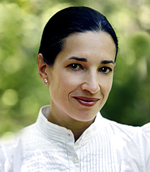Ramie Targoff’s love story
She talks about how love and sex are presented in Renaissance poetry

Ramie Targoff
Professor of English Ramie Targoff teaches and studies Renaissance literature, with an emphasis on the relationship between literature and religion. She recently finished a book on the poetry and religious works of John Donne (click here to read a Catalyst article on her Donne research), and is currently working on a book on erotic verse in the English Renaissance. She is on sabbatical this semester, but answered these Valentine’s Day-inspired questions by e-mail.
BrandeisNOW: Poetry has been written about many different topics, but love seems to be the most common. Why?
Ramie Targoff: Ovid says that he was trying to write about war when he became distracted by love, and it may be true to say that poems about love and war were traditionally the most common. But why poetry and love go together is something I couldn't answer very easily or quickly, except to say that the impulse to express yourself, and to make beautiful objects out of your expression, seems to be a deeply human impulse. And lyric poetry does this perhaps better than any other art form.
BN: You're on sabbatical right now in Rome, where you're completing your book, "Posthumous Love: Erotic Verse in the English Renaissance." That title is intriguing—can you tell me a little more about the book?
RT: This book is about a single interesting change that came about in the aftermath of the Protestant Reformation: namely, the idea that love could not transcend death. In Italian love poetry—most spectacularly in Dante and Petrarch—the death of the beloved poses no obstacle to love. In fact, it makes that love more spiritual and intense. In England, by contrast, the idea that love could extend beyond the grave was not compatible with Protestant attitudes towards the relationship between the living and the dead, and as a result, we get a body of poetry that draws limits to love. The most powerful expression of this is in “Romeo and Juliet,” which is at the center of my book, and in which Romeo and Juliet declare at their grave their desire to rest together in the earth for all eternity. There is no mention, however, of their souls ascending to heaven (in the Italian sources to the story, this is what they both say). My book is about the eradication of the Italian idea of posthumous love, and how that eradication manifests itself in the lyric poetry and drama of the English Renaissance.
BN: Why did you pick English Renaissance erotic poetry to research? Also, love poetry goes back millennia—what's so special about Elizabethan poetry that attracted you?
RT: What I originally fell in love with, as it were, was the sonnet. This is the 14-line poem from Italy in the English Renaissance, and it is the form that many of our greatest love poets use. There is something about its compactness, its compression, its turns and resolutions, that make the sonnet an incredibly powerful poetic form, and I’ve been teaching and writing about sonnets for most of my professional career.
BN: We often don't take the long view and assume that today's sexualized culture and openness about love and sex is new. What were the attitudes of Elizabethans, and how did they demonstrate these attitudes through their poetry? Were they a bit more strait-laced than us, or vice-versa?
RT: It’s hard to generalize about this—cultures are complicated things. There are plenty of erotically explicit poems written in the Renaissance, poems that take us step by step through the undressing of a woman, or poems that celebrate the beauty of someone's nipple, or poems that describe the orgasm that comes at the end of sex, albeit this is usually in highly metaphorical language. But there are other things that are rarely described, and that make the Elizabethans look, well, Victorian, compared to the ancient Romans, who were very explicit and frank.
BN: Did the Elizabethans ever decouple, as it were, love from sex—that is, make love more or less cerebral and perhaps more virtuous?
RT: Of course—there was a significant strand of what we call "platonic" love poetry, and what they would have called "neoplatonic" love poetry, in which it was the love of the soul, and not of the body, which motivated the poet. Or at least so the poet claimed—Donne, for example, makes fun of this as a possibility, but other poets—such as Spenser, for example—express spiritual love as distinct from earthly love quite explicitly.
BN: Do you have a favorite love poem or love story?
RT: Right now my favorite love poem is Donne's "The Anniversarie," and the reasons connect to the argument of my book. In this poem, Donne imagines what it would like to be lovers in heaven, but he is discouraged by the idea that then he and his lovers would just be souls like everyone else, no more or less blessed. He decides, finally, to opt for more life on earth: "Here upon earth we are kings." The poem ends: "Let us love nobly, and live, and add again years and years unto years." This embrace of the love that he and his mistress are enjoying now seems to me a wonderful affirmation of our lives, and loves, on earth, without hoping or praying for anything else.
BN: Is there anything you'd like to add about love?
RT: Not at the moment, but I will be teaching my course on love poetry (Love Poetry from Sappho to Neruda) in the fall so I hope to discuss all of these things with my students then.





